What's Happening?
U.S. Energy Secretary Chris Wright has expressed strong skepticism about the feasibility of achieving net zero emissions by 2050, labeling the target as a 'colossal train wreck.' Wright's comments were made during an interview with the Financial Times and shared by the U.S. Department of Energy on social media. He argues that the goal is unattainable and would lead to significant human impoverishment. Wright, a former oil and gas executive, acknowledges climate change as a global issue but criticizes what he terms 'climate alarmists.' His remarks come ahead of his participation in the Gastech energy conference in Milan, Italy, alongside Interior Secretary Doug Burgum. The net zero target aims to balance carbon emissions with carbon removal, a goal adopted by over 140 countries, including major polluters like the U.S., India, and the European Union.
Why It's Important?
The skepticism expressed by Energy Secretary Chris Wright regarding the net zero by 2050 target has significant implications for U.S. climate policy and international commitments. If the U.S., a major global emitter, does not pursue aggressive carbon reduction strategies, it could hinder global efforts to limit warming to 1.5 degrees Celsius, as outlined in the Paris Agreement. Wright's stance may influence domestic energy policies, potentially favoring fossil fuel interests over renewable energy investments. This could impact industries reliant on clean energy initiatives and affect the U.S.'s role in international climate negotiations. Critics argue that dismissing the net zero target undermines scientific consensus on climate change and could delay necessary actions to mitigate environmental impacts.
What's Next?
As Wright and Burgum attend the Gastech energy conference, discussions on global energy strategies and climate commitments are expected to continue. The U.S. may face pressure from international partners to clarify its stance on climate goals and demonstrate leadership in reducing emissions. Domestic reactions could include debates among policymakers, environmental groups, and industry stakeholders about the feasibility and necessity of achieving net zero emissions. The Biden administration's climate agenda may be scrutinized, with potential calls for reassessment of targets and strategies to address climate change effectively.
Beyond the Headlines
Wright's comments highlight a broader debate on the balance between economic growth and environmental sustainability. The criticism of net zero targets raises ethical questions about the responsibility of high-income nations to lead climate action and support lower-income countries in their transition. Long-term implications may include shifts in public perception of climate policies and the role of government in addressing environmental challenges. The discourse may also influence cultural attitudes towards energy consumption and conservation efforts.








